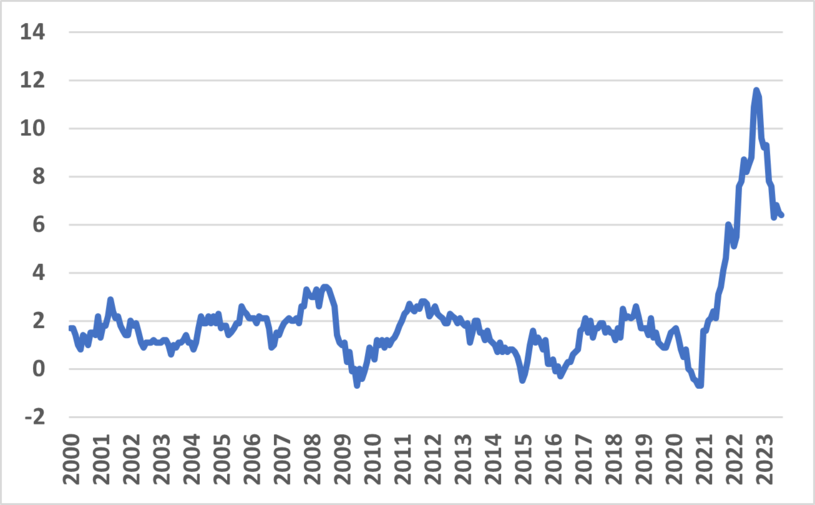Since 2021, Germany has been facing a sharp rise in price levels. This has been driven by a combination of factors, such as a recovery in demand due to the lifting of pandemic restrictions on the one hand and supply bottlenecks accompanied by high energy prices following Russia’s invasion of Ukraine on the other.
How can such drastic price changes affect households, especially after 20 years of low inflation rates (see Figure 1)? Unexpected inflation has large wealth effects: it erodes the real value of debt with fixed nominal obligations, while reducing the real value of nominal savings. Hence, unexpected inflation redistributes wealth from nominal savers to borrowers.

Knowledge about the erosion channel of inflation
In a recent SAFE Working Paper No. 400 we investigate households’ awareness of and their responses to the wealth effects of inflation. Providing direct evidence on households is of importance to policymakers and economists alike who seek to understand the consequences of the redistribution effects of monetary policy. We aim to contribute to this literature by conducting a large survey-based randomized control trial (RCT) among customers of a major German bank.
We find that households are largely informed about inflation-induced nominal-asset erosion, while knowledge about the debt-erosion channel of inflation is limited. More specifically, 75 percent of participating bank customers rate the impact of an unexpected increase in inflation on fixed-rate savings products as very negative or negative. In contrast, only 25 percent (9 percent) of respondents consider the impact of an inflation increase on fixed-rate loans to be (very) positive (see Figure 2). Awareness of the erosion channel correlates with multiple characteristics, such as business education, wealth, stock ownership and general knowledge about inflation.

Spending decisions in times of high inflation
How does the provision of information about the erosion channel of inflation affect households’ beliefs and economic decisions? In the information experiment, the control group only receives information about the current inflation rate, while treatment groups additionally receive information about the erosion of savings or the erosion of debt.
Participants who learn about debt erosion express less debt aversion and increase their real-net-wealth estimates by 2.5-2.9 percentage points relative to the control group. This positive treatment effect on wealth is driven by net debtors who are more strongly affected by debt erosion. Learning about savings erosion leads to lower real-net-wealth estimates, but to a lesser extent than for debt erosion. Provision of information about debt erosion further increases planned and actual spending and leads households to choose a higher debt/price ratio in a hypothetical real estate transaction.
Call for better financial literacy of households, in particular poorer ones
The results in the paper suggest suboptimal debt choices at the individual level given a large fraction of the survey population was initially uninformed about the debt erosion caused by surprise inflation. In addition, wealthier, more educated survey participants are better informed about inflation-induced nominal-position erosion, which raises the concern of a countervailing redistribution of wealth from less informed households to better informed households.
These findings call for policy action. One specific possible action is information campaigns targeted at lenders. In interactions with (prospective) borrowers, mortgage advisors may want to explain inflation-induced erosion of fixed-rate debt. An advantage of this approach is that it is also in the lenders’ interest because knowledge about debt erosion should make debt more attractive. Mortgage advisors at the bank that collaborates with us for this project plan to highlight debt erosion more often in interactions with (potential) clients.
More generally, the results of this study underline the importance of policies that broadly foster financial literacy. First general steps have recently been taken at the European and national level. As part of the 2020 capital markets union action plan, the European Commission and the Organisation for Economic Cooperation and Development (OECD) have developed a financial competence framework for adults. This framework is intended to provide a conceptual basis for the development of national financial education strategies, the design of financial education programmes and learning materials, and their evaluation. As the only G20 country without a strategy for financial literacy, the German government announced its initiative in April 2023. It intends to develop a financial literacy strategy in cooperation with the OECD, a platform to link existing programmes and to strengthen research.
Philip Schnorpfeil is a postdoctoral researcher at Goethe University Frankfurt and a recipient of the 2022--23 Lamfalussy Research Fellowship by the European Central Bank.
Andreas Hackethal is Senior Researcher and Coordinator of the Pension Finance Lab at SAFE and is Professor of Finance at Goethe University Frankfurt.
Michael Weber is Associate Professor of Finance at University of Chicago.
Blog entries represent the authors’ personal opinion and do not necessarily reflect the views of the Leibniz Institute for Financial Research SAFE or its staff.

